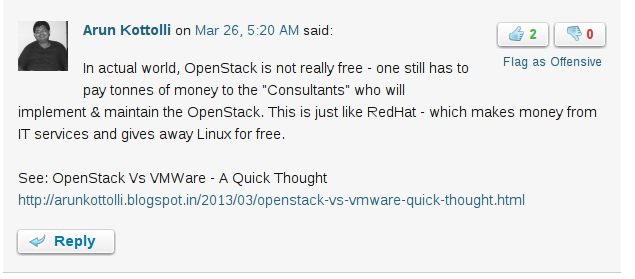Forbes article recently ran an article on Paypal dropping VMware from 80,000 servers in favour of OpenStack
In it the author, one Reuven Cohen, writes:

One carefully non-vetted commentator
The link hidden under the word commentator on that story on the Forbes page takes you to a comment on this Business Insider piece.
I've reproduced the comment here if you can't be bothered to click through:
 Business very insider
Business very insider
Arun kindly links to his blogspot piece in that comment (which I'm pretty sure was added sometime after I first read it).
No mention on the Forbes article, or the Business Insider comment, that he works for EMC (VMware) – though he does reveal this on his blogspot piece, in which we find this recycled quote:
 In actual world
In actual world
Elsewhere in his blog he writes retrospectively presciently:
All this sounds like the good old story of Windows Vs Linux battle, where there were routine announcements of some big company replacing Windows with Linux. Even after a decade of Linux Vs Windows battle, both the systems are still going strong and Microsoft's revenue from Windows Server sales has actually increased enormously.
Bizarrely under each use of the word Linux there (presumably he actually means GNU/Linux – a product that VMware relies heavily upon) he has a link to redhat.com, but even more bizarrely under each use of Windows he has a link through to http://www.micorsoft.com/.
I kid you not, on either count.
Anyway, apart from overestimating Microsoft's revenue from their Server product, misstating the trend in recent years on that front, confusing Linux for GNU/Linux (or just for Redhat Corp), thinking GNU/Linux has been a competitor for only ten years (maybe IBM's investment on this front back in the late 90's isn't covered in schools anymore) there's a fundamentally faulty comparison to contend with.
Arun goes on to say that:
OpenStack is free - but it has several moving parts inside, so implementing and maintaining OpenStack is not easy or cheap. There will be costs involved and it carries risks - mainly security and IT infrastructure management risks for the end customers.
Lots of things have lots of moving parts inside (a phrase I find ill-placed in the software world, but nonetheless).
It doesn't mean they're necessarily more fragile, or that the risks are necessarily larger. Especially given we're then advised that VMware has a "... better road map for cloud scale IT infrastructure ..." and that VMware will "... in the long run lower the total cost of ownership."
Having budgeted a infrastructure project that included a hefty VMware component, I'd be curious to see any proof of this lower TCO claim – but Arun doesn't provide any such proof.
Finally, a small concession is made:
OpenStack has its merits, It is free and for most part - easy to deploy. The main challenge with OpenStack is to maintain it - Both in terms of managing the upgrades/patches to the stack and the overall infrastructure management: Configuration, Availability, Performance, Security.
Companies such as Rackspace, Amazon, Google, Facebook etc - who have deep technical expertise and an army of IT engineers to manage their IT infrastructure, OpenStack can save money even in the long run. But most enterprises, don't have such capabilities and they are better off with an established VMWare solution ...
(The Openstacks in those paragraphs are all links to the Business Insider story, despite the reader kind of expecting them to link through to http://openstcak.com or similar.)
Anyhoo, in the context of a story about PayPal, which the Business Insider story clearly talks about running, and intending to migrate, 80,000 servers, Arun basically seems to be agreeing that they're big enough to give VMware the finger and move to a free platform that they can easily look after themselves.
Good work, Arun.